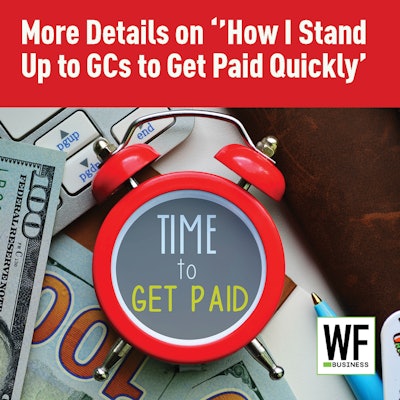
Wood Floor Business got a question from a reader about my article "How I Stand Up to GCs to Get Paid Quickly". (Before we dive into this, I want to note that for those of us who work for stores, we can safely substitute the term "store" for "GC".) Here was what the reader wrote:
I was reading one of Angelo DeSanto's articles on how to get paid by your GC. I love the article, but I wanted to ask a couple questions:
1) I, too, read the prompt payment laws in California, and the way I read it was that the GC has 10 days to pay after receiving payment from the client. What I am running into (because the GC’s I work for know I read the laws) Is that they just keep telling me they haven’t received payment. There are times when I actually know they have been paid but it is a very difficult conversation to have. I am running into this situation quite frequently. So really I am just asking: Am I wrong?
2) Does the GC have to pay 10 days from completion? We have fired more GC’s this year than I ever thought possible. I really want to know the definitive laws so that I can put it in my contract to the GC.
What the reader is referring to is California Business And Professions Code Section 7108.5. This the actual text:
A prime contractor or subcontractor shall pay to any subcontractor, not later than 10 days of receipt of each progress payment, unless otherwise agreed to in writing, the respective amounts allowed the contractor on account of the work performed by the subcontractors, to the extent of each subcontractor's interest therein. In the event that there is a good faith dispute over all or any portion of the amount due on a progress payment from the prime contractor or subcontractor to a subcontractor, then the prime contractor or subcontractor may withhold no more than 150 percent of the disputed amount. Any violation of this section shall constitute a cause for disciplinary action and shall subject the licensee to a penalty, payable to the subcontractor, of 2 percent of the amount due per month for every month that payment is not made. In any action for the collection of funds wrongfully withheld, the prevailing party shall be entitled to his or her attorney's fees and costs. The sanctions authorized under this section shall be separate from, and in addition to, all other remedies either civil, administrative, or criminal. This section applies to all private works of improvement and to all public works of improvement, except where Section 10262 of the Public Contract Code applies.
This next statute, California Business And Professions Code Section 7120, is the ringer. It says that if the GC simply “has the capacity to pay” or, restated, simply has money in their bank, they have to pay—even if they have not been paid by the client. The sub's contract is with the GC, NOT the client of the GC. The statute reads (the boldface emphasis is mine):
Willful or deliberate failure by any licensee or agent or officer thereof, to pay any moneys, when due for any materials or services rendered in connection with his operations as a contractor, when he has the capacity to pay or when he has received sufficient funds therefor as payment for the particular construction work, project, or operation for which the services or materials were rendered or purchased constitutes a cause for disciplinary action, as does the false denial of any such amount due or the validity of the claim thereof with intent to secure for himself, his employer, or other person, any discount upon such indebtedness or with intent to hinder, delay, or defraud the person to whom such indebtedness is due.
There is a penalty for not paying within 10 days—and it hurts the GC's—a lot.
A relevant case about that is Morton Engineering & Construction Inc. v. Patscheck from 2001. In this case, Morton Engineering and Construction was hired by Stanley Patscheck as a concrete subcontractor on a project for the El Tejon Unified School District. Patscheck failed to pay Morton for its work, claiming that it was suffering from financial problems caused by another subcontractor. When Patscheck received the retention proceeds from the public agency, he offered Morton $42,800 as full and final settlement of all claims arising out of the project. This was the amount Patscheck admitted was due Morton under the contract but excluded the cost of extra work, interest and penalties. Morton rejected the offer. Morton then obtained a judgment that included penalties for failure to make progress payments and to pay retention within the time required by California Business and Professions Code §7108.5 and California Public Contract Code §7107. The half-day court trial resulted in judgment for Morton in the amount of $111,316.73, which included all sums due under the contract plus the extra work, interest, penalties, attorney fees and costs.
In our reader’s situation, I encourage him to simply take the GC to court and keep exquisite records of any hardship the late payment created. Late fees, interest fees, costs and hardship, etc.—all of it! Make a detailed list.
Also, I would encourage the reader to put this clause into all future contracts with all GC’s:
"This contract supercedes all other contracts for above mentioned work between subcontractor and GC contractor."
The reason is:
1. The GC's make you sign your life away to work for them, and they include indemnity clauses to their benefit should they slow (or no) pay the subcontractor.
2. The GC's think subcontractors are idiots, so let them think that way. Don't give them a clue that you are sharp. Use their ignorance to get them to sign your contract. If you need to, you can blame on your bookkeeper (say your bookkeeper is "old school" about having your contract signed, for example).
3. Including the clause above makes your contract rank primary in a court of law, and sets the subcontractor up for a win—as long as the GC was the last contractor to sign contracts on the work (use time/date stamps!).
We need to put our livelihoods and our families first, and not worry if the GC or store will become upset if we exercise our rights under the law.


































